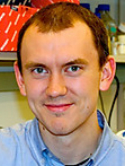Precision microbiome reconstitution restores bile acid mediated resistance to Clostridium difficile Journal Article
| Authors: | Buffie, C. G.; Bucci, V.; Stein, R. R.; McKenney, P. T.; Ling, L. L.; Gobourne, A.; No, D.; Liu, H.; Kinnebrew, M.; Viale, A.; Littmann, E.; van den Brink, M. R. M.; Jenq, R. R.; Taur, Y.; Sander, C.; Cross, J. R.; Toussaint, N. C.; Xavier, J. B.; Pamer, E. G. |
| Article Title: | Precision microbiome reconstitution restores bile acid mediated resistance to Clostridium difficile |
| Abstract: | The gastrointestinal tracts of mammals are colonized by hundreds of microbial species that contribute to health, including colonization resistance against intestinal pathogens(1). Many antibiotics destroy intestinal microbial communities and increase susceptibility to intestinal pathogens(2). Among these, Clostridium difficile, a major cause of antibiotic-induced diarrhoea, greatly increases morbidity and mortality in hospitalized patients(3). Which intestinal bacteria provide resistance to C. difficile infection and their in vivo inhibitory mechanisms remain unclear. Here we correlate loss of specific bacterial taxa with development of infection, by treating mice with different antibiotics that result in distinct microbiota changes and lead to varied susceptibility to C. difficile. Mathematical modelling augmented by analyses of the microbiota of hospitalized patients identifies resistance-associated bacteria common to mice and humans. Using these platforms, we determine that Clostridium scindens, a bile acid 7 alpha-dehydroxylating intestinal bacterium, is associated with resistance to C. difficile infection and, upon administration, enhances resistance to infection in a secondary bile acid dependent fashion. Using a workflow involving mouse models, clinical studies, metagenomic analyses, and mathematical modelling, we identify a probiotic candidate that corrects a clinically relevant microbiome deficiency. These findings have implications for the rational design of targeted antimicrobials as well as microbiome-based diagnostics and therapeutics for individuals at risk of C. difficile infection. |
| Keywords: | metabolism; transplantation; colonization; phylogeny; intestinal microbiota; domination; spore germination; sequencing data; communities; human feces |
| Journal Title: | Nature |
| Volume: | 517 |
| Issue: | 7533 |
| ISSN: | 0028-0836 |
| Publisher: | Nature Publishing Group |
| Date Published: | 2015-01-08 |
| Start Page: | 205 |
| End Page: | 208 |
| Language: | English |
| ACCESSION: | WOS:000347477600037 |
| DOI: | 10.1038/nature13828 |
| PROVIDER: | wos |
| PUBMED: | 25337874 |
| PMCID: | PMC4354891 |
| Notes: | Article -- Source: Wos |
Altmetric
Citation Impact
BMJ Impact Analytics
MSK Authors
Related MSK Work


















